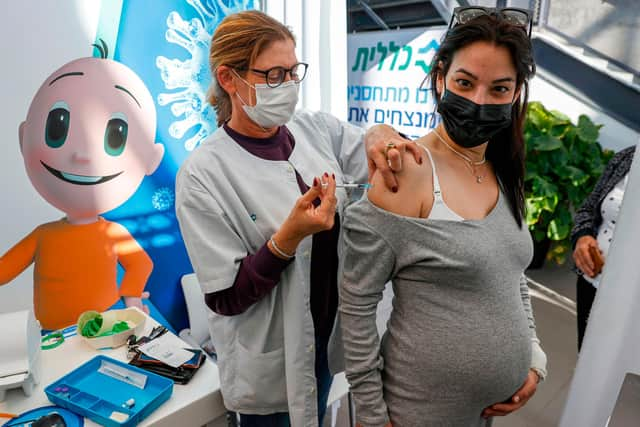Can I have the Covid vaccine when pregnant? Advice for expectant mothers - and which jab is recommended
and live on Freeview channel 276
Pregnant women can get the Covid-19 vaccine and should be offered it when eligible, based on their age and clinical risk group.
Under previous guidance, the vaccine has only been offered to pregnant women when their risk of exposure to the virus was high, such as health workers, or if a woman had underlying conditions placing her at higher risk of coronavirus-related complications.
Advertisement
Hide AdAdvertisement
Hide AdWomen who are breastfeeding can also have the vaccination and the NHS has said there is no evidence that the jab has any effect on the chances of becoming pregnant after receiving it.


However, women who are pregnant are advised to speak to their GP before getting the jab to discuss the benefits and risks.
Here is the latest guidance and which coronavirus vaccines are recommended.
Which Covid vaccine should be offered?
New guidance issued by the Joint Committee on Vaccination and Immunisations (JCVI) has said there were “no specific safety concerns” identified with any brand of Covid-19 vaccines available in relation to pregnancy.
Advertisement
Hide AdAdvertisement
Hide AdHowever, the JCVI said it is ‘preferable’ for women to be given the Pfizer or Moderna coronavirus vaccines when called for their jab.
This recommendation comes as these vaccines have both been more widely used during pregnancy in other countries, and have not caused any concerns.
Data from the US showed around 90,000 pregnant women had received coronavirus jabs, which were mainly the Pfizer and Moderna vaccines, “without any safety concerns being raised”.
As a result, the JCVI is now advising that pregnant women in the UK should be offered these two vaccines where available, rather than the AstraZeneca jab.
Advertisement
Hide AdAdvertisement
Hide AdDr Mary Ramsay, head of immunisation at Public Health England (PHE), said: “The available data on the Pfizer-BioNTech and Moderna vaccines provide confidence that they can be offered safely to pregnant women.
“The Covid-19 vaccines continue to save thousands of lives and it is important that we encourage as many people as possible to take up the offer when it is their turn.”
Is AstraZeneca unsafe?
The JCVI has said there is no evidence to suggest that other vaccines, such as the AstraZeneca jab, are unsafe for pregnant women, but “more research is needed”.
It is understood that the Pfizer and Moderna vaccines are considered preferable because they are the jabs for which safety information relating to pregnant women is available, whereas there currently is not as much relevant data on other vaccines, including AstraZeneca.
Advertisement
Hide AdAdvertisement
Hide AdProfessor Wei Shen Lim, Covid-19 chair for JCVI, said: “We encourage pregnant women to discuss the risks and benefits with their clinician – those at increased risk of severe outcomes from Covid-19 are encouraged to promptly take up the offer of vaccination when offered.
“There have been no specific safety concerns from any brand of Covid-19 vaccines in relation to pregnancy.
“There are more real-world safety data from the US in relation to the Pfizer-BioNTech and Moderna vaccines in women who are pregnant – therefore, we advise a preference for these to be offered to pregnant women.”
Read more:
Seek advice before the jab
Advertisement
Hide AdAdvertisement
Hide AdThe JCVI is still advising pregnant women to discuss the risks and benefits of being vaccinated against Covid-19 with their GP before getting the jab.
It added that, although uncommon, severe illness due to Covid-19 is more likely in later pregnancy.
Pregnant women with symptomatic Covid-19 infection are two to three times more likely to give birth prematurely, according to the JCVI.
It explained that the “greatest risk factor” for severe Covid-19 outcomes is age, “which is why pregnant women should be invited for vaccination along with their age or clinical risk group”.
Advertisement
Hide AdAdvertisement
Hide AdPHE advice states that if you are pregnant and think you are at high risk, you should discuss having, or completing, the vaccination with your doctor or nurse.
If you have had your first vaccine dose and then become pregnant:
- you should discuss having the second dose with your doctor or nurse
- you may choose to have the second dose or delay it until after the pregnancy is over
There is no need to avoid pregnancy after vaccination.